“If it’s a fight they want, it’s a fight they’re going to get.”
SMART General President Michael Coleman spoke those words to elected delegates at the SMART General Convention in Las Vegas, Nev., in August 2024. Nearly a year has passed since then, and a lot has happened in the United States and Canada: Both countries have new political leadership, for example, and daily life has changed for many SMART members and families in each of our nations.
But one thing hasn’t changed: From the shop floor to the bargaining table, from the bus to the rail yard, from state and provincial governments to Ottawa and Washington, DC, SMART is fighting for what matters: members and working families.
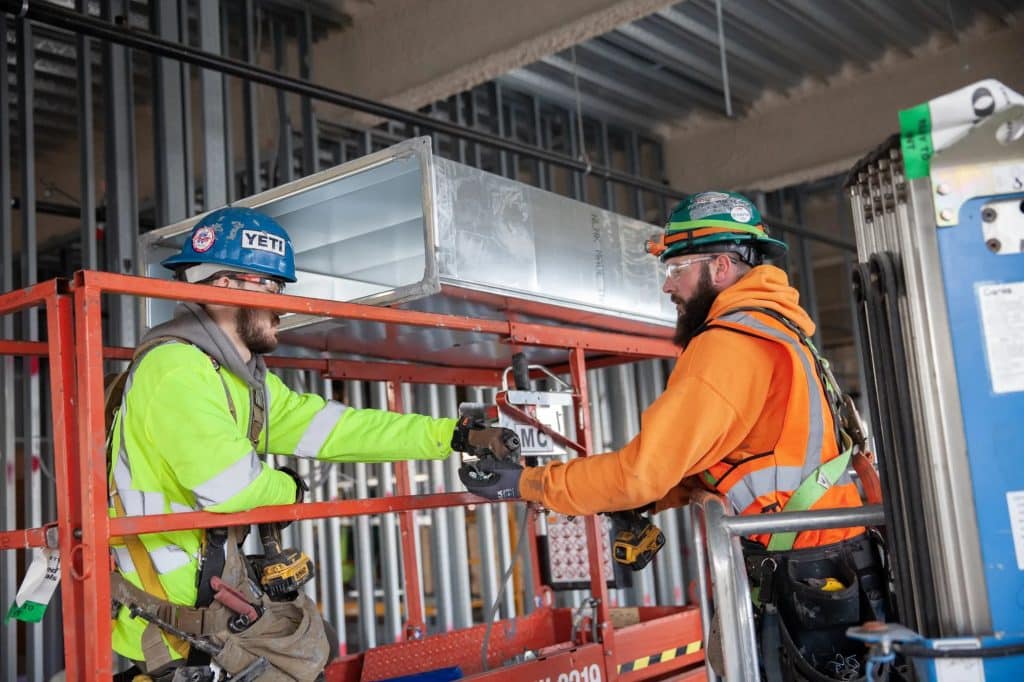
There have been some high-profile fights in recent months. The U.S. Department of Energy canceled funding awards for a variety of clean energy projects that created jobs for SMART members and working families, taking construction work away from hardworking Americans. In Canada, the costs of tariffs have made themselves felt viscerally, and Ontario SMART members’ jobs are in limbo after the pausing of a Honda megaproject. Federal funding cuts took future work away from sheet metal members in San Diego, New Mexico and beyond; uncertainty around policies and global trade continues to impact both the construction and transportation industries, and some local unions now have out-of-work lists for the first time in years.
But as General President Coleman has repeated, fighting for members is what we do as trade unionists. And from the International to the local union level, that fight doesn’t stop.
Fighting in DC, Ottawa and beyond
For better and for worse, federal lawmaking has a big effect on union workers. In the railroad industry, the actions of Congress impact everything from members’ contract negotiations to new safety regulations. And for sheet metal workers, construction projects that create union jobs are often funded directly and indirectly by provisions in federal laws.
That’s why SMART’s International staff fights 24/7/365 to help educate representatives, senators, members of Parliament and other officials about what they can do to benefit members.

SMART had a constant presence in Washington, DC, throughout negotiations on the 2025 reconciliation bill. Governmental Affairs staff met repeatedly with both representatives and senators, explaining precisely how provisions in the legislation that cut tax credits, infrastructure funding, Medicaid funding and more would negatively impact SMART members’ work opportunities and health care coverage. Unfortunately, Congress passed a bill, signed into law by President Trump, that included cuts to programs and tax credits that create jobs for thousands of SMART sheet metal workers, cut Medicaid funding for those who need it most, and more.
“Members will lose work. Costs will go up. And that just doesn’t make sense,” said General President Coleman.
But the fight doesn’t stop. Just like every year, SMART-TD led the charge on Railroad Day on the Hill 2025 in Washington, bringing together a coalition of 13 rail labor unions to meet with representatives, senators and staff to fight for union railroaders. Representatives from every craft of the rail industry — train and engine crews, signal maintainers, dispatchers, car knockers, track department and more — were divided into strategic teams. Each group was armed with a full day’s schedule of back-to-back meetings with lawmakers in the House and Senate.
“In the past two years, railroad day events, SMART-TD’s message and the way we delivered it struck a chord. We knew we had created something powerful with this model,” said former SMART-TD National Legislative Director Greg Hynes. “And this year proved it. We scheduled and executed over 130 meetings on the Hill, our most ever. That kind of momentum builds on itself.”
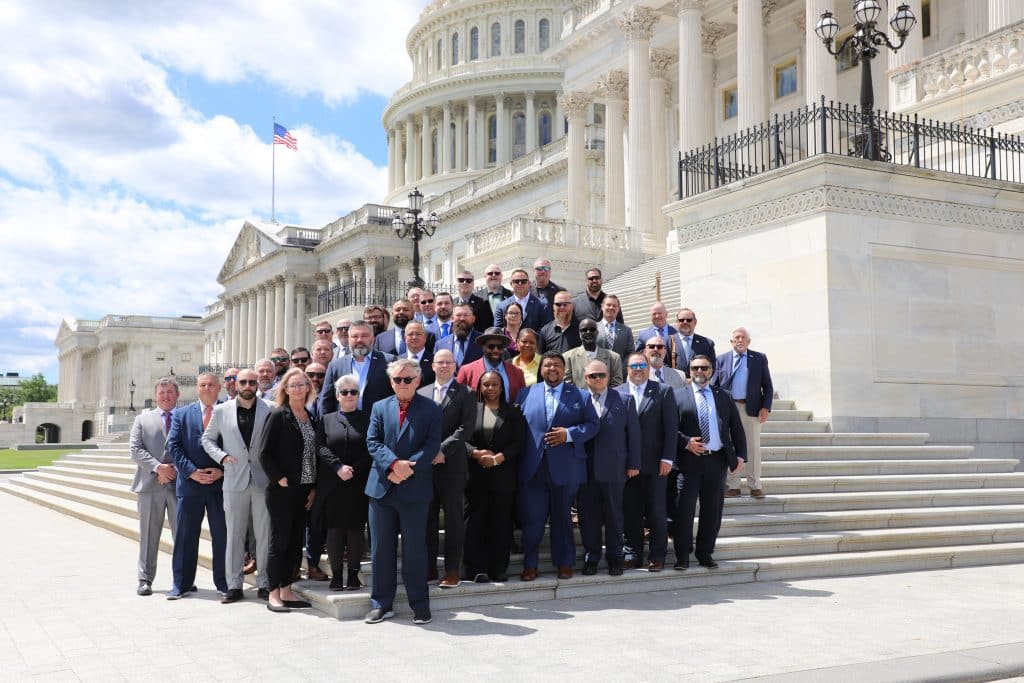
SMART Canada has pursued the same advocacy, both in Ottawa and in provincial governments across the country. These efforts look set to reward sheet metal workers and roofers: New Prime Minister Mark Carney announced a Federal Major Projects Office intended to cut project approval times and put skilled tradespeople to work, and even before elections took place, SMART Canada had secured funding for training to help members build Canada’s green future.
But sometimes, elected officials have no role to play in major developments that affect SMART members. In those instances, SMART and allies fight for members in whatever venue is available.
When the Department of Defense tried to end the use of project labor agreements (PLAs) on large-scale construction projects, it was a direct threat to SMART members’ jobs. North America’s Building Trades Unions (NABTU), which SMART is an affiliate of, did not back down. Together, the building trades stood up for union members and American workers. And ultimately, a federal judge ordered the Department of Defense to go back to using PLAs.
PLA advocacy also extended to the White House, with NABTU and affiliates like SMART communicating just how important project labor agreements are to workers across America. That paid off at least partially in June, when the Office of Management and Budget sent a memo saying the White House “supports the use of PLAs when those agreements are practicable and cost effective” — though the memo did leave plenty of room for exceptions, and does not require PLAs on projects that cost more than $35 million.
“Although it doesn’t contain the same protections as the Biden administration, this is a step in the right direction. Project labor agreements create jobs for SMART members and working people across our country,” General President Coleman said in response. “All of us at SMART appreciate and applaud this guidance from the White House, and we look forward to keeping this conversation going. But we encourage them to go further, for the sake of our members, our families and our neighbors.
“We will continue to do everything we can to keep creating jobs for SMART members and Americans nationwide, and we encourage all agencies to support the use of PLAs on all federally funded projects.”
SMART-TD had the same fighting mentality in the 11th Circuit Court of Appeals in Miami, Florida, in June, when Associate General Counsel Shawn McKinley stood shoulder-to-shoulder with the Federal Railroad Administration in defending the FRA’s rule requiring two-person crews on freight trains. Importantly, that defense was bolstered by the testimony of SMART members. When Association of American Railroads (AAR) attorneys dismissed the more than 13,000 public comments submitted in favor of the two-person crew rule, calling them “anecdotes,” McKinley swiftly countered, reminding the court that these weren’t “random” comments or “anecdotes.” They were firsthand accounts from thousands of trained railroaders — the very people the rule is designed to protect.
Winning what members deserve
While federal governments and national labor events tend to make the loudest headlines, some of the most impactful SMART campaigns take place at the local level. From the bargaining table to the shop floor, sheet metal and Transportation Division locals are winning huge victories for members.
In San Carlos, California, members of SMART-TD Local 1741’s Local Committee of Adjustment for San Carlos Schools ratified a new tentative agreement with 96% approval. Their new contract includes a pay increase that will eventually grant members the highest pay rate in the region for school bus operators; a doubling of the employer’s 401(k) match; union release time; enhanced discipline and grievance procedures that give members a stronger voice on the job; and more.
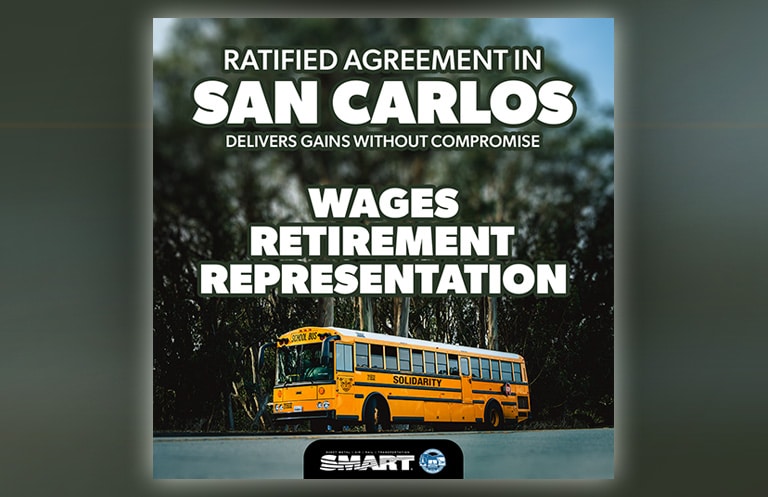
Meanwhile, railroaders working for the Alabama Port Authority stood strong against management’s efforts to divide and conquer. The employer tried to exploit a wage disparity between pre-2008 and post-2008 employees, proposing incentives to divide the membership. But the members of SMART-TD Local 598 refused to take the bait, instead demanding pay equity across the board. As a result, local officers were able to secure an agreement that ensures major gains in wages, benefits and crew consist protections.
In Kitchener, Ontario, a four-year organizing campaign paid off for the members of Local 562 when the local welcomed 56 new members who made the switch from the Christian Labour Association of Canada (CLAC), strengthening market share in the area.
And in Philadelphia, sheet metal workers united to win a strong agreement with the Sheet Metal Contractors’ Association. This followed prolonged negotiations and preparations for a strike that never materialized: As Local 19 wrote to members, “make no mistake — this fight is about respect. It’s about value. It’s about ensuring that every member of Local 19 is seen, heard and fairly compensated for the skill, pride and dedication they bring to the job every single day.”
Solidarity at the statehouse
Fights like the one described by Local 19 go beyond the bargaining table: Sheet metal locals have also mobilized in state governments to win laws that create work for SMART members and working families.
For many years, bad-faith contractors have exploited custom offsite fabrication loopholes to win bids on public works projects and/or jobs that are covered by project labor agreements, preventing offsite fabrication work from going to SMART members and depriving offsite fabricators from getting the union-won pay and benefits that all working people deserve. That’s why SMART locals nationwide consistently fight to extend prevailing wage to cover custom offsite fabrication work. Local 38 and Local 49 recently won laws that did exactly that in Connecticut and New Mexico, respectively: huge victories that will help SMART members, signatory contractors and working people in both states.
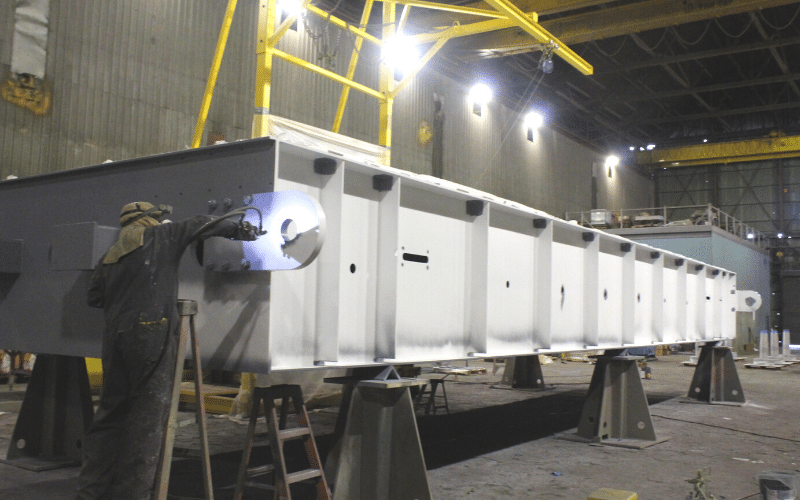
“The way this type of bill helps us grow our membership is, it increases our volume of market share by having equal wages across fabrication shops,” said Local 49 Business Manager and Financial Secretary-Treasurer Isaiah Zemke. “Everyone’s having to pay that same state prevailing wage for these public works projects.”
Local unions are also working to secure indoor air quality work for sheet metal members. In Virginia, SMART Local 100 helped win the passage of HB2618: Public school buildings; indoor air quality, inspection and evaluation. The bill adopts several requirements for school districts to help ensure there is proper indoor air quality in public school buildings, mandating that at least once every four years, each school district conducts an industry-recognized uniform inspection and evaluation of the HVAC system. The bill outlines that the evaluation must be performed by a skilled, trained and certified workforce — in a state where more than half of public schools are over 50 years old, the legislation is expected to create work for SMART sheet metal workers.
Meanwhile, in Colorado, Governor Jared Polis signed an HVAC Improvements for Public Schools bill into law, which will require school districts to thoroughly assess and upgrade their HVAC systems using certified contractors when spending federal infrastructure or education funds, and to provide for regular maintenance and inspection of HVAC systems following installation. It also directs the governor to use remaining Bipartisan Infrastructure Law funds to assist school districts in finding certified contractors and writing grants to access federal funding, and instructs the state Department of Labor and Employment to create a list of certified HVAC contractors schools can hire from.

“The biggest win for me is that we’ve now enshrined our HVAC standards into law. This ensures that when schools undergo assessments and upgrades, they are working with certified contractors who meet workforce standards, including prevailing wage and apprenticeship utilization,” said Local 9 Business Manager Jon Alvino. “The certified contractor list created through this bill guarantees that those who pay prevailing wages and participate in registered apprenticeship programs are eligible. It’s a huge step forward for ensuring quality work and supporting skilled local labor.”
SMART-TD puts safety first
As Congress continues to stall on federal transportation safety legislation, SMART-TD isn’t waiting to bring the fight to the local level. TD members have racked up an impressive number of legislative wins centered on securing or strengthening safety protections this year.
In Maryland, SMART-TD passed a transit safety bill that protects bus and passenger rail workers from violent assaults by requiring the Maryland Transit Administration to form a safety-focused workgroup in consultation with SMART-TD and other unions. The group will create a passenger code of conduct and roll out a variety of internal safety improvements.
TD Local 202 secured permanent funding for the Office of Railroad Safety in Colorado after more than two years of tireless organizing, lobbying and standing firm in the face of corporate and political games. The office is charged with collecting and analyzing safety data, including the impact of train length, crew size and scheduling on accident rates — key areas that the carriers and the AAR have consistently claimed lack “data to support.” SMART-TD then passed a second new law in Colorado that enacts “Transit Worker Assault and Training Requirements,” which widens the definition of a transit worker and imposes harsher penalties for transit assaults.
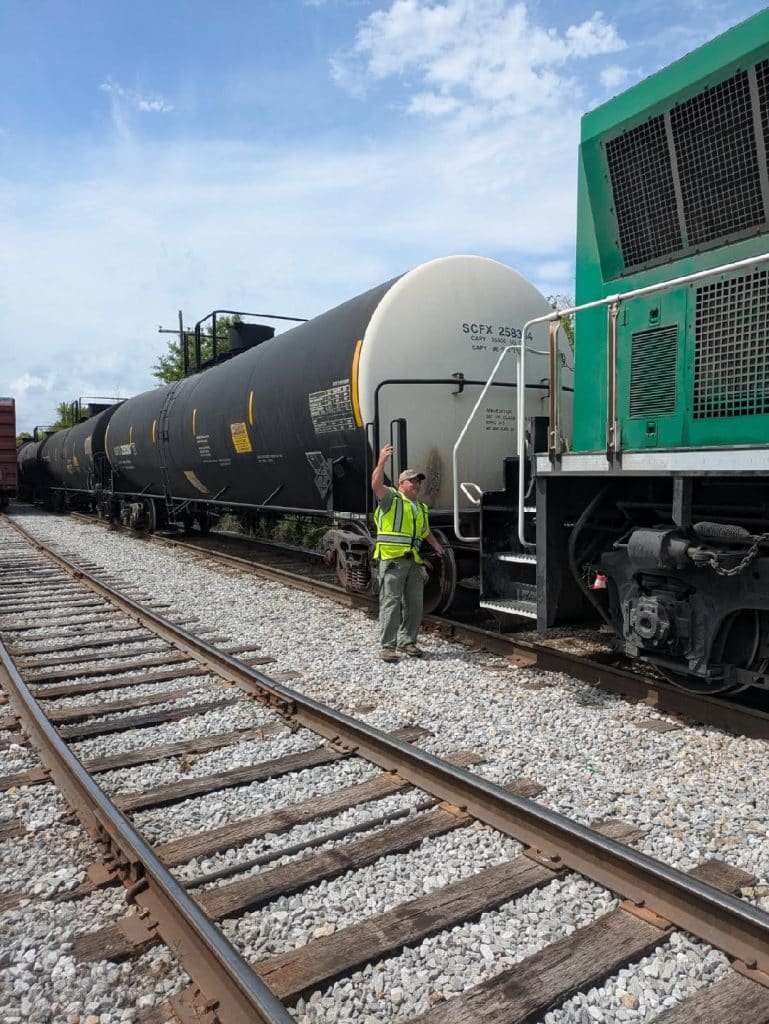
In Massachusetts, SMART-TD successfully broadened the definition of “public employee” and “assault” to cover transit workers employed by private companies in the commonwealth, closing an unintended loophole that barred them from the same level of protection as public transit workers.
And collaboration across SMART-TD state legislative boards helped win passage of two major laws in Arkansas, both of which originated in other states (Nebraska and Illinois, respectively). One law protects railroaders’ anonymity in reports on railroad fatalities; the other strengthens the consequences for serious vandalism on rail property and for assault of transportation workers. Those laws will benefit SMART members, and they show the value of communication and solidarity across our union.
SMART programs benefit members and families
In the backdrop of the various fights detailed in this article, SMART continues to offer groundbreaking programs to benefit members. Those include SMART’s pioneering childcare benefit partnership with TOOTRiS, available to sheet metal members at participating local unions in the U.S.; SMART’s maternity leave benefit fund program, also available to United States sheet metal members whose local unions have adopted the program in their health & welfare plans; and Union EAP, an employee assistance program designed to support members’ mental health — created by organized labor, for organized labor.
These benefits, too, are part of the fight. They are explicitly designed to help improve the lives of SMART members and their families.
“These programs are about making things better for SMART members,” General President Coleman concluded. “Because we, SMART members, are worth fighting for. And we’ll continue to fight every single day.”
Related News
- Canceled Cleveland-Cliffs project leads to lost jobs for Dayton-area construction workers
- Local 9 wins work-creating law for members in Colorado
- Streak of Organizing Wins, Strong Agreements Highlights the SMART-TD Difference
- General President Coleman’s statement on the Department of Energy canceling $3.7 billion in funding awards for energy projects
- Education Department helps unionists strengthen advocacy in Pittsburgh
- San Carlos School Bus Operators ratify substantial wage and 401(k) increases
- New Mexico Local 1687 sets new precedent with Red Apple Transit
- GP Coleman to SMART-TD NTS attendees: “We will fight for the membership”